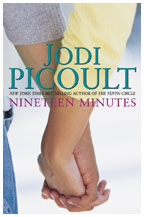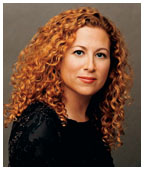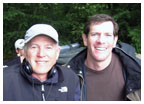
June 6, 2007: Books and Arts
Reading Room
A fictional school shooting
Jodi Picoult ’87 churns out best-sellers on tough topics
Documenting the life of castrati
‘Friends’ who frame
each other
Screenwriter David Digilio ’96’s new TV show airs on ABC
For a complete list of books received, click here.
Jodi Picoult ’87’s new novel about a bullied high school student who murders fellow school students was published a month before the Virginia Tech massacre. (Gasper Tringale) |
Reading
Room
A
fictional school shooting
Jodi Picoult ’87 churns out best-sellers on tough topics
By Maria LoBiondo
Jodi Picoult ’87 produces novels with amazing regularity — mimicking nature by researching and writing them on a nine-month cycle — to the delight of her many fans. Her 14th novel, Nineteen Minutes, hit stores in March and topped The New York Times’ best-seller list its first week out.
Her fiction has tackled euthanasia, sexual abuse, child abduction, fatal illness, and teen suicide pacts. Her latest novel takes on bullying and school shootings, and was published by Atria Books just weeks before the April 16 Virginia Tech rampage by a student who killed 32 people. Bullying and school shootings are disturbing subjects that Picoult says she hopes to help her readers examine through her characters, fleshing out “What would I do?” as the action twists and turns.
 “My
job is to look at all sides of an issue, to give you a sense of why you
have your opinion, and let you see the other side,” says Picoult
during a book-tour stop March 26 — her first author-related return
to Princeton — sponsored by the student chapter of the Friends of
the Library.
“My
job is to look at all sides of an issue, to give you a sense of why you
have your opinion, and let you see the other side,” says Picoult
during a book-tour stop March 26 — her first author-related return
to Princeton — sponsored by the student chapter of the Friends of
the Library.
In Nineteen Minutes, lives are changed irreparably when an often-bullied high school junior acts out his revenge fantasies in a school shooting. The setting is a small town in New Hampshire, not unlike where Picoult lives now with her husband, Tim Van Leer ’86, and their three children. And while she did not mine her children’s tough knocks for inspiration, bullying strikes a chord for most adults, she says, including herself. As a 13-year-old, she and some friends lobbied for an English honors class, and “a kid came by my locker and called me a freak,” she recounts. “Then he slammed the locker closed on my fingers.”
To write this book, Picoult conducted extensive journalistic research, as she says she does for all her novels. Her interviews with Columbine grief counselors surface in the plot with a technique employed to comfort parents — telling each family that their child was the first to die to make them believe their children didn’t suffer so much — a strategy that backfired in Columbine and again in the novel when parents talked to each other about their tragedies. She didn’t interview students from Columbine: Eight years later, “the experience is still so raw,” she says. But she based a main character on a young man who lost his best friend in a 2003 Cold Spring, Minn., high school shooting.
Picoult would not comment about the Virginia Tech tragedy beyond a statement
she posted on her Web site, noting that shootings on college campuses
often are motivated by different factors than the ones she researched
on high school shootings for Nineteen Minutes. ![]()
Maria LoBiondo is a PAW contributor.
For a complete list of books received, click here.
 The
Little Book of Common Sense Investing: The Only Way to Guarantee Your
Fair Share of Stock Market Returns — John C. Bogle ’51
(John Wiley and Sons). The author, who created the world’s first
index mutual fund, offers advice on how to successfully invest in index
funds and incorporate this strategy into a portfolio. Bogle is the founder
of the investment management company Vanguard Group and was senior chairman
until 2000.
The
Little Book of Common Sense Investing: The Only Way to Guarantee Your
Fair Share of Stock Market Returns — John C. Bogle ’51
(John Wiley and Sons). The author, who created the world’s first
index mutual fund, offers advice on how to successfully invest in index
funds and incorporate this strategy into a portfolio. Bogle is the founder
of the investment management company Vanguard Group and was senior chairman
until 2000.
 Bible Road:
Signs of Faith in the American Landscape — Sam Fentress
’77 (David and Charles Publishers). While driving through 49 states
over the past 25 years, Fentress saw thousands of religious signs. In
this book he has collected more than 150 photographs he took of the signs
on beauty-salon windows, highway pylons, silos, and burger-joint marquees.
Fentress’ work is in the collections of the Los Angeles County Museum
of Art, the Art Institute of Chicago, and the Princeton University Art
Museum.
Bible Road:
Signs of Faith in the American Landscape — Sam Fentress
’77 (David and Charles Publishers). While driving through 49 states
over the past 25 years, Fentress saw thousands of religious signs. In
this book he has collected more than 150 photographs he took of the signs
on beauty-salon windows, highway pylons, silos, and burger-joint marquees.
Fentress’ work is in the collections of the Los Angeles County Museum
of Art, the Art Institute of Chicago, and the Princeton University Art
Museum.
 The Day the
Earth Caved In: An American Mining Tragedy — Joan Quigley
’86 (Random House). The author re-creates a disaster that began
in 1962 when a fire at the town dump in Centralia, Pa., moved underground
into an abandoned mine, igniting layers of coal. Townspeople largely ignored
the fire until Feb. 14, 1981, when a 12-year-old boy fell into a sinkhole
and nearly died. The mine fire still burns today. Quigley is a former
Miami Herald reporter.
The Day the
Earth Caved In: An American Mining Tragedy — Joan Quigley
’86 (Random House). The author re-creates a disaster that began
in 1962 when a fire at the town dump in Centralia, Pa., moved underground
into an abandoned mine, igniting layers of coal. Townspeople largely ignored
the fire until Feb. 14, 1981, when a 12-year-old boy fell into a sinkhole
and nearly died. The mine fire still burns today. Quigley is a former
Miami Herald reporter. ![]()
By K.F.G.
(Matthu Placek/©2006, the trustees of Princeton University) |
Documenting the life of castrati
Three years ago Anthony Roth Costanzo ’04 (above) created, produced,
and starred in a full-scale operatic production, “The Double Life
of Zeferino,” about the life of a castrato, for his senior thesis.
Castrati were male singers in 18th-century Italy who were castrated before
puberty to maintain their soprano singing voices. Filmmaker Gerardo Puglia
followed Costanzo on his creative journey — from rehearsals on campus
to Italy, where Costanzo consulted with a costume maker in Venice and
visited the San Carlo Theater in Naples (above), where the castrati tradition
originated — to make a 23-minute documentary, “Zefirino: The
Voice of a Castrato.” The film has won a Director’s Choice
Award at the Black Maria International Film Festival and a Platinum REMI
award for best in arts and culture at the Houston International Film Festival.
Puglia’s wife, Gaetana Marrone-Puglia, a professor of French and
Italian who taught Costanzo, was the film’s producer. Costanzo,
who sang six 18th-century arias in his thesis performance and sings throughout
the film, is enrolled in a master’s degree program in opera at the
Manhattan School of Music. ![]()
(photos courtesy David Digilio ’96 (inset); Warner Bros.) |
‘Friends’
who frame each other
Screenwriter David Digilio ’96’s new TV show airs
on ABC
By Kate Mattingly ’93
David Digilio ’96, inset, is the creator of a new TV drama, “Traveler,” about two friends whose roommate frames them for a terrorist attack. Above, the actors from “Traveler,” from left: Matthew Bomer (who plays Jay Burchell), Aaron Stanford (who plays Will Traveler), and Logan Marshall-Green (who plays Tyler Fog).
The idea for a new TV show came to screenwriter David Digilio ’96 in 2005 during the 10th reunion of his wife, Kim Sladkin Digilio ’95, when he was surprised to see how much people had changed since college. “It got me thinking, how well do we really know our friends? Particularly in college when ... so many people try to reinvent themselves,” says Digilio, who had written the screenplay for the film Eight Below. That July, he shared his idea with his agent for a TV show about two friends whose roommate frames them for a terrorist attack.
The show premiered Thursday, May 10, at 10 p.m., and then was scheduled to move to Wednesdays at 10 p.m., starting May 30, on ABC for eight episodes.
Traveler explores friendship, along with the paranoia of today’s post-Sept. 11 society. Three friends finish graduate school and head out on a cross-country road trip. At the first stop, one of the friends, Will Traveler, frames the other two for the bombing of a New York art museum. “These two friends are then forced to go on the run and figure out who the hell was this guy they just spent two years of their lives with, and why did he do this?” explains Digilio.
As the creator and co-executive producer of Traveler, Digilio wrote the pilot and helped oversee the writing, casting, and editing of the series. His team includes director David Nutter, known for launching hit shows like Without a Trace, and executive producers Dan Jinks and Bruce Cohen, who won an Oscar for the film American Beauty.
Although Digilio has made it to network TV, he says he spent several years “paying his dues” in Los Angeles — fetching coffee, learning how to structure a story, and working as an assistant to film producer Tom Sternberg ’59, who was making The Talented Mr. Ripley. At night Digilio wrote a script about a blind Princeton athlete restarting his life through rowing that won a Walt Disney Screenwriting Fellowship in 2001. The following year Digilio was hired into Disney’s Professional Studio Writer Program where he worked on Eight Below, about a team of sled dogs left alone to survive a harsh Antarctic winter when two explorers must abandon them.
It was at Princeton that Digilio found his calling working behind the
camera. “I always thought I would be in front of the camera. A movie
star. ... But at Princeton, I was quickly put in my place. I never got
the leading-man roles,” says Digilio, who majored in psychology
and earned a certificate in the Program in Theater and Dance. For his
senior thesis, he wrote a one-man show that examined the psychology behind
serial murder. Writing his thesis, he says, “hooked me on the storytelling
process.” He has not acted since. ![]()
Kate Mattingly ’93 lives in Austria, where she teaches and writes about the arts.



